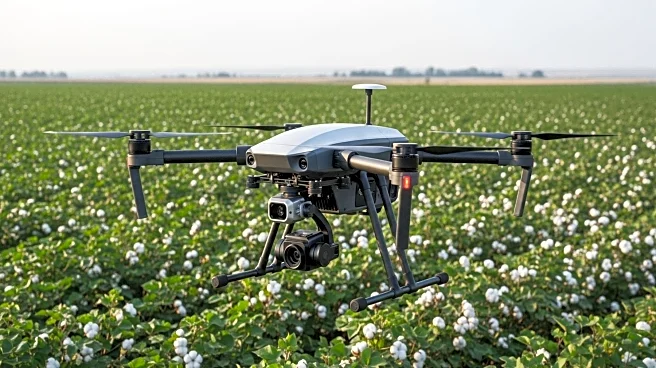What is the story about?
What's Happening?
A research project in Jenkins County, Georgia, is utilizing AI-powered sensors to optimize pesticide use in cotton farming. Led by Georgia Southern University and the City of Millen, with support from the University of Georgia Cooperative Extension and FarmSense, the initiative aims to improve pest detection and reduce pesticide exposure. The project involves deploying AI-based insect monitoring systems, such as the FlightSensor, which uses machine learning algorithms to identify pest species by their wingbeats. This technology allows farmers to apply pesticides more precisely, potentially lowering harmful residues in soil and air while supporting sustainable farming practices.
Why It's Important?
The implementation of AI in agriculture represents a significant shift towards precision farming, which can lead to reduced pesticide use and improved environmental health. By enhancing pest detection, farmers can save on costs and labor, while minimizing health risks associated with pesticide exposure. This project not only supports sustainable agriculture but also builds local expertise in agtech, opening career opportunities and fostering digital literacy in rural communities. The initiative serves as a model for how AI can be applied to address real-world challenges in agriculture, potentially benefiting other rural areas across the U.S.
What's Next?
The project is expected to continue developing AI applications that support community needs, encouraging more civic AI initiatives. As farmers and students gain experience with AI tools, the potential for broader applications, such as managing other pests like mosquitoes and ticks, increases. The success of this pilot could lead to expanded use of AI in agriculture, promoting innovation and economic growth in rural communities. Continued collaboration between academia, government, and industry will be crucial in scaling these efforts and adapting them to other regions.
Beyond the Headlines
This initiative highlights the potential for AI to drive rural innovation, challenging the notion that technological advancements are limited to urban or corporate settings. By focusing on community-driven solutions, the project demonstrates how small towns can harness AI for economic and social benefits. The emphasis on building local agtech talent underscores the importance of inclusive innovation, ensuring that rural areas are not left behind in the digital age.
















